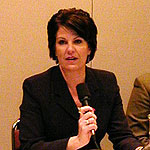By Tim Pugmire
Minnesota Public Radio
January 18, 2002
|
| RealAudio |
Minnesota's education commissioner is taking heat from school leaders over the Ventura administration's plan for fixing the state budget deficit. Christine Jax of the Department of Children, Families and Learning tangled with superintendents who've grown increasingly frustrated over education funding issues.
| |
|
|
|
||
Public school leaders have been complaining for the past year about inadequate state funding. Budget cuts and teacher layoffs have hit many school districts in recent months. Now, a state budget shortfall is compounding the problem, and schools are bracing for more cuts.
Christine Jax, commissioner of the Department of Children, Families and Learning, faced a tough but mostly polite audience when she spoke to members of the Minnesota Association of School Administrators.
Asked for advice on addressing local cuts, Jax declined, saying district financial circumstances are too unique to make generalizations.
"I feel, actually, uncomfortable doing that because you are financial leaders and curriculum leaders. And I wouldn't want to be so pretentious to assume I could come up with something you haven't already come up with," she said.
Superintendents could be heard grumbling while Jax defended Gov. Ventura's plan for addressing the state budget deficit. The proposal includes a one-percent cut in education funding next year, and a 2.6-percent cut the following year. No reductions are proposed to the basic per-pupil funding formula.
But there are cuts in special education and other specialized aids. Ventura also wants to phase in state money promised last year to the school districts that haven't passed local tax levies. Following the meeting with Jax, Superintendent Tom Ames of St. Charles said small, poor districts like his will be hurt without that $415-per-pupil payment.
"The only way for us to now be structurally balanced would be to cut 10 of our 69 teachers, because it costs us approximately $42,000 with insurance and fringe benefits and salary to put a teacher in the classroom. What this administration is doing is balancing the state education budget on the backs of the poorest districts and trying to hide the real cuts," he said.
|
"What this administration is doing is balancing the state education budget on the backs of the poorest districts and trying to hide the real cuts.
"
- Tom Ames, St. Charles school superintendent |
School leaders are also concerned about Ventura's plan to bring in more revenue by adding the state sales tax to all school district purchases.
Sauk Centre Superintendent Dan Brooks says eliminating the sales tax exemption would still mean a net loss to schools. "We'd be better off and more forthright with the people if we just came out and said we do need to cut by X percent - the equivalent of the amount that's going to be paid in sales tax," Brooks said.
Jax says the sales tax is fair, because cities and counties are required to pay it. She told the school superintendents that any cuts in the money targeted for schools will be hard to make.
"The money that was there was there because we believed it was the thing to do and we believed it was a good idea. So we're cutting into things, not because we don't think they matter or they're dumb or they're irrelevant. We're cutting into things because we have a two billion dollar deficit. And we're looking for ways to solve that problem," she said.
Jax called her session with the superintendents hard and grueling. But she says she also benefits from hearing their concerns firsthand before the start of the legislative session.
Mary Ann Nelson of Fridley says the tension between superintendents and the commissioner comes is the result of years of tight funding and the feeling that the concerns of educators aren't being heard by the governor.
"I'm looking for an understanding of the reality of what's happening out there. And more communication of issues and communication of problems, so we can get some real dialogue going," Nelson said.
Superintendents and other state education groups will continue to spread their message about budget needs when the Legislature returns to the state Capitol Jan. 29.
More from MPR
